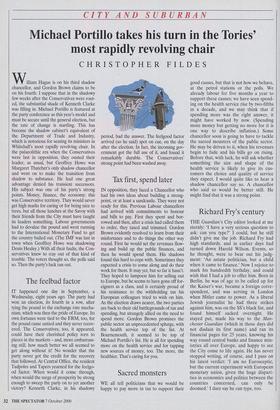Tax first, spend later
IN opposition, they faced a Chancellor who had his own ideas about building a strong- point, or at least a sandcastle. They were not ready for this. Previous Labour chancellors had arrived with commitments to honour and bills to pay. First they spent and bor- rowed and then, after a crisis had called them to order, they taxed and trimmed. Gordon Brown evidently resolved to learn from their misfortunes and to do things the other way round. First he would set the revenues flow- ing and build up the public finances, and then he would spend them. His shadows found this hard to cope with. Sometimes they expected a crisis to come along and do their work for them. It may yet, but so far it hasn't. They hoped to lampoon him for selling out to Europe, but he seems to have gone off for- eigners as a class, and is certainly proud of his resistance to the withholding tax his European colleagues tried to wish on him. As the election draws nearer, the two parties are back to their old battlegrounds of tax and spending, but strangely allied on the need to spend more. Gordon Brown promises the public sector an unprecedented splurge, with the health service top of the list. At Bournemouth, it seemed to be top of Michael Portillo's list. He is all for spending more on the health service and for tapping new sources of money, too. The more, the healthier. That's caring for you.


















































































 Previous page
Previous page